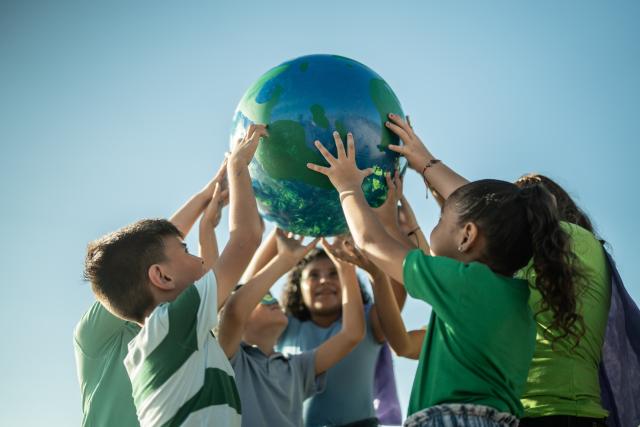For Earth Week, Moderator Carmen Lansdowne writes about actions and choices for climate justice that may preserve our future.

Unless you organize or participate in protests, lately it feels like Earth Days pass without a lot of reflection. Thirty years ago, we thought of Earth Day in specific terms: save a species by protecting its habitat; repair the hole in the ozone by limiting aerosols; save forests by recycling paper. Joining environmental actions was often complicated, but, at least on the surface, there were simple, concrete actions we thought might have an impact.
But the climate emergency is not just a big problem; it’s the end of the world as we know it, as the Intergovernmental Panel on Climate Change indicated recently when it released its AR6 Synthesis Report. While policies and laws addressing mitigation have expanded since the previous report, it’s likely that warming will exceed 1.5°C by 2030 because of global greenhouse gas (GHG) emissions. It will be harder to keep it below 2°C.
So what?
The IPCC report notes it has “very high confidence” on four statements (this is the part where the world ends):
- For every increment the temperature rises, the risks, destructive impacts and related losses from climate change escalate.
- Climate change threatens human wellbeing and planetary health.
- The window of opportunity to secure a livable and sustainable future for everyone is rapidly closing.
- Deep, rapid and sustained mitigation and accelerated adaptation in this decade would reduce projected losses and damages for humans and ecosystems.
It’s not just a complicated problem – it’s a complex, urgent one.
With complex problems, laws and governing systems don’t always work – they’re too one-size-fits-all. That’s not to say there shouldn’t be laws – but adaptability and flexibility in our solutions is needed for a climate in crisis. When we perceive complex problems as a threat – real and imagined – our brains seem to lose the ability to think creatively.
But what if the end of the world as we know it means we step outside the constraints of the world as we think we know it?
What if we didn’t have to choose between the economy and our environment?
What if we created carrots and sticks to motivate sectors, households and people to focused action, to move the needle on climate this decade?
What if we embrace the fact that there are no one-size-fits-all solutions, and we all did what we could, even if it felt small? Decarbonizing our businesses. Committing to public transit. A staycation rather than international travel. Or choosing to take an international trip, but powering every-day life using renewables.
Most of all, we need to talk about what we want to see from each other. Not confrontationally, where we beat each other over the head about our shortcomings – we need to inspire each other.
The truth is – the climate emergency is death by a thousand papercuts. Responding to it reminds me of something someone told my family more than 20 years ago after my older brother died: Nothing helps, and everything helps.
While the current economic situation and rising inflation causes us to think seriously about our household and government budgets, we also need to think about our climate budgets. We need to empower our politicians and civil servants to create a carbon budget for Canada so we can meet our international commitments.
In 2022, The United Church of Canada committed to reduce its carbon emissions by 80 per cent by 2030. Yes, that’s the same year that the IPCC says that warming will exceed 1.5°C.
Seven years.
Close enough to see tangible reductions, but also to make a plan and to act. We’re doing it by working with 260 congregations to make their buildings more energy-efficient; our goal is 500 communities by 2025. For the completed projects, savings in equivalent carbon are 628 metric tonnes of CO2, or the annual energy use of 147 homes.
We also committed to stronger advocacy for bold climate action with provincial and national governments, and we’re building on our 2015 divestment from fossil fuels by amplifying our investment and business actions.
Whether your motivation is social justice, faith, economic resiliency, or science – actions and choices now can make a difference for the future. Let’s end the world as we know it, and allow a new world of creative, innovative and accountable breakthroughs to turn the thermometer down.
Are you in?
— The Right Rev. Dr. Carmen Lansdowne, Kwisa’lakw, was elected as Moderator of The United Church of Canada in July 2022. She is a member of the Heiltsuk First Nation. She was ordained in 2007 and has served the church locally, nationally, and with the World Council of Churches. She is currently on leave from her position as Executive Director of First United Church Community Ministry Society, which serves the people of Vancouver’s Downtown Eastside.
United Church communities together with faith communities across the country are Praying, Learning, and Acting for Climate Justice as part of Together for the Love of Creation Earth Week. In-person and online events are happening across the country. You can go to this map to see a full roster of events. Change takes all of us. Each action brings hope. We are making hope visible across the country.
The views contained within these blogs are personal and do not necessarily reflect those of The United Church of Canada.